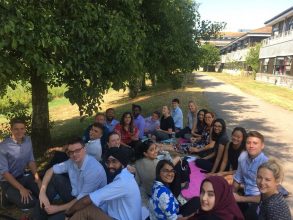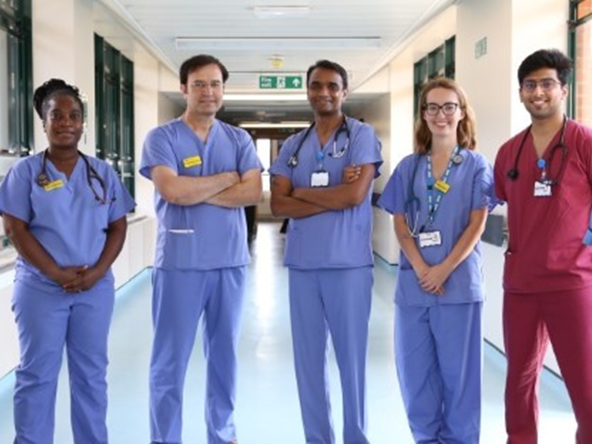Trust Contact Details
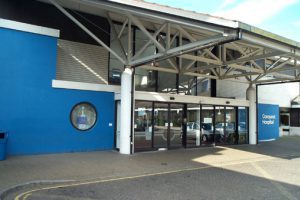
Conquest Hospital, The Ridge, St Leonard’s on Sea, East Sussex, TN37 7RD
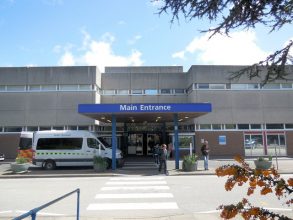
Eastbourne District General Hospital, Kings Drive, Eastbourne, East Sussex, BN21 2UD
Switchboard
0300 13 14 500
Medical HR esh-tr.medicalhr@nhs.net
Trust website:
www.esht.nhs.uk
Trust Foundation webpage
www.esht.nhs.uk/medical-education/foundation
Foundation Training Programme Directors
Dr Mohammad J H Rahmani (F1 cross site)
Miss Sarah Tang (F2 cross site)
Director of Medical Education
Dr Mark Whitehead (cross-site)
Medical Education Manager
Mike Dickens (cross-site)
Operational Management
Luisa Tomasetti – Programme Leader F1 (cross-site) luisa.tomasetti@nhs.net
Foundation Programme Administrators
Mina Wareham F2 (Conquest Hospital) mina.wareham@nhs.net
Anita Todd F2 (Eastbourne DGH) anitatodd@nhs.net
Julie Deeprose F1 (Conquest Hospital) julie.deeprose@nhs.net
Angela Geoghegan F1 (Eastbourne DGH)
Hannah Dadd F1 (Eastbourne DGH)
Facilities
Postgraduate Centre
Learning resource education centres are available on both hospital sites along with many other training facilities including equipped skills laboratories.
Accommodation
Accommodation is available on both sites. Rooms are fully furnished and each flat has a shared kitchen. Utensils are provided. Laundry services are available on both sites. For further information, please go to https://www.esht.nhs.uk/medical-education/trainee-support/hospital-accommodation/
Social activities
Both Conquest and Eastbourne hospitals have an on-site nursery. Various social events are held over the year, such as the Welcome BBQ and various activities in the evenings, such as paddle boarding and doctor community walks as part of a dedicated Freshers’ week of activities during the F1 Shadow Week. A Medical Careers Evening is held annually in October for foundation doctors who are looking to reinforce their decision making on their future career path. The event enables the foundation doctors to have direct access to a wide range of senior clinical colleagues from different specialties. A virtual resource is also available.
A calendar of regular social events for all foundation doctors and faculty are put together by our dedicated pastoral fellows as we recognise the need to have some ‘downtime’ together with the opportunity to network with colleagues, educational and clinical supervisors, their medical education team, medical HR and other support staff relevant to their training needs. The foundation doctors organise a summer ball and winter celebrations amongst other informal events, such as curry nights and bowling.
Both Conquest and Eastbourne hospitals have Doctors’ Mess facilities that have recently been refurbished. There is a membership fee which enables access to the mess day and night, and other facilities such as SKY TV, snacks and drinks, as well as discounts on social events during the year.
For information relating to Medical Education events and promotions - please check out our website and dedicated twitter page: @ESHT_IE
Website: www.esht.nhs.uk/medical-education
Library and IT facilities
Both libraries have internet access 24/7 in their PC rooms. Wi-Fi is also available. https://www.esht.nhs.uk/about-the-trust/departments/knowledge-and-library-services/
Parking facilities
The hospital operates a parking scheme. Everyone who wishes to park on site at Conquest Hospital or Eastbourne DGH need to display a permit.
The scheme applies to all people who work and park their vehicle on those sites, including our staff and the staff of other employers. There will be an annual permit administration charge to cover the costs of running the scheme.
To apply for the parking scheme, please visit this link https://permit.esht.nhs.uk
Local Area
Transport links
The Conquest Hospital (St Leonard’s on Sea) is around 60 miles south of London. Trains run regularly from Hastings to London, with an average journey time of 1 ½ hours. Hastings main rail station is approximately 3 miles from the hospital. A new link road has opened which reduced traffic congestion and travel time between the two acute hospital sites. A number of new build housing estates are springing up in the area.
Bus travel – www.stagecoachbus.com and www.traveline.org.uk
Train travel – www.nationalrail.co.uk
Eastbourne Rail Station is approximately 1.5 miles from the Eastbourne DGH. Main line trains from London Victoria run regularly to Eastbourne. Trains from London Victoria are fast and frequent, taking just 1 ½ hours.
Local amenities/attractions
East Sussex is so much more than a great place to work – it is a fantastic place to live and visit. Hastings is a famous, historical town and seaside resort situated on the south-east coast of Britain. The town has a castle built by William the Conqueror in the 11th Century, an attractive old town, fishing harbour and seafront. The west of Hastings is modern and lively with a theatre, cinema, many restaurants, bars and clubs, as well as a shopping centre with many well-known shops. There are also many places of interest to visit in the town and plenty of events throughout the year, such as the Hastings Sea Food Festival and ‘Pirate Day’. More information can be found at www.1066country.com and www.hastings.gov.uk

Eastbourne has many restaurants, pubs and clubs. Famous for its tennis and stunning scenery used in many films. Other picturesque spots include Beachy Head and Sovereign Harbour. There is 10-pin bowling alley, yachting, and surfing clubs, sports centres and theatres. A new shopping centre has been built with the addition of another state of the art cinema in the main town. More information can be found at www.eastbourne.gov.uk
Foundation Specific
Induction/Shadowing Arrangements
At the Eastbourne DGH and Conquest, we arrange a formal induction and shadow period for the new F1s. This helps foundation doctors in their first year to settle in and get used to their new clinical environments. We also provide the opportunity for overseas doctors to benefit from an extended additional shadowing period, prior to taking part in formal shadow/Induction at the Trust.
Our trust website provides comprehensive and current Information on working for ESHT – https://www.esht.nhs.uk/working-for-us/.
Please also note our dedicated Medical Education website pages www.esht.nhs.uk/medical-education which hold specific information relating to our Foundation Programme and more details on the individual specialties you might be interested in, and the types of support you can expect to receive from us, such as careers advice and pastoral support.
Tasters
These are supported via your respective foundation administrators and all foundation doctors are encouraged to take up the opportunity to participate in taster time in their specialty of interest. F1s can request a taster session during the final rotation of the year.
Simulation and Human Factors
We have fully equipped clinical skills rooms, including Simulation suites in both education centres. Our simulation programme is ever evolving to develop the programmes we run and our facilities with dedicated support from our excellent educational fellows and our SIM team colleagues. Both sites run simulation training sessions (a requirement of the curriculum), which have been well received by the foundation doctors.
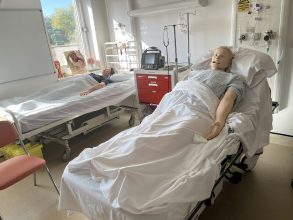
Foundation doctor feedback
We encourage foundation doctors to provide feedback throughout the year both formally and informally. Trainee representatives for each year (F1 and F2) are nominated and they attend the Foundation Local Faculty Group Meeting, representative of their year group. The Foundation Training Programme Leads and Foundation Leaders hold individual meetings with the foundation doctors as required throughout the year and there are also dedicated Foundation focus groups scheduled at the end of each placement, with key members of the leadership team in Medical Education to discuss progress and feedback. This doctor feedback is consistently taken into account when we are looking to make improvements to our Foundation Programme. Our aim is to provide a supportive environment where foundation doctors can gain experience through facilitation and encouragement. Our respective sited medical education team, encourage an “open door” policy where foundation doctors are welcome to come and discuss anything relating to their training and post.
Educational and clinical supervision
We realise that it can be hard to make the transfer from medical student to doctor and we endeavour to support our F1s as much as possible with this transition. We have a foundation doctor support process in place to ensure that help is provided as soon as it is needed. As an F1/F2 you will be supported during your 4-month rotation in your specialty of choice, learning key skills that can then be utilised for the rest of your career. Support will be provided by your dedicated educational supervisor, clinical supervisors, your programme lead as well as the larger specialty team. All of whom will give you regular constructive feedback on your progress and what you can do to improve. This will better enable you to deliver core competences from the Foundation Curriculum. Foundation doctor progress is reviewed via the Horus eportfolio, requiring the doctor to complete set modules by way of:
- Observation
- Direct supervision
- Independent practice
- Attendance at relevant training courses and events
The onus is on reflective practice.
Core teaching programme
The programme includes F1 and F2 formal weekly teaching sessions, monthly afternoon workshops, directed and self-directed personal learning, structured appraisal and assessments. The teaching programme covers all aspects of the Foundation Curriculum. Foundation doctors are encouraged to participate in all learning opportunities both in the Education Centres and in clinical settings, as well as virtually.
Additional information
ILS and SIM – during the F1 year we arrange for you to attend ILS and Simulation Training. In F2 we arrange for you to attend ALS and Simulation Training. Study leave for F2s is available and details will be provided on commencement.
Foundation Leadership Management Programme (FLM) – ESHT are pleased to announce that 5 of our current F1s have enrolled for the 2023-24 FLM programme. The FLM programme is mapped to UKFPO curriculum and to a recognised national qualification. It is fully funded by the apprenticeship levy and we are pleased to support foundation doctors with this programme.
Currently there are 47 F1 rotations. Each rotation comprises 3 x 4-month posts. F1 doctors may do night shifts and are rostered for weekends and long days/evening shifts in the acute specialties. F1 rotations include General Medicine, Urology, Diabetes, Respiratory, Rheumatology, Cardiology, T&O, General Surgery, Gastroenterology, ITU ENT, Paediatrics, Palliative Care and Psychiatry. Some posts also include time in the Acute Assessment Unit. All F1s are required to work nights in surgery. F1s (dependent on their rota and subject to change for each new intake) can be on call.
At present, there are 55 F2 rotations which include General Medicine, ENT, Palliative Care, Public Health, GP, Paediatrics, Urology, Psychiatry, Ophthalmology, T&O and Cardiology, Elderly Medicine, Respiratory, Diabetes and Emergency Medicine.
The F2s in ENT are part of the Hospital@Night team in Surgery and work a 1:13 on-call. F2s work in ENT from 0900 – 1700hrs and then any out of hours is with the Hospital@Night team.
All community placements include a day or half a day attachment per week in Emergency Medicine, ITU, MAU and AAU (this is optional and flexible). It is essential that foundation doctors have a car for F2 placements in Public Health (Lewes), Palliative Care, Psychiatry and some General Practice surgeries, which range from urban to rural or more coastal areas. Paediatric community placements are based at Bexhill and occasional cross-site travel is required.
T&O, Paediatrics and all of our Surgery rotations are based at the Conquest site.
We also host the Basic Surgical Skills (BSS) course twice a year, which is strongly recommended for all foundation doctors, who have strong inclinations towards surgical specialties. ESHT has been nominated as one of the best providers of the BSS course in the Southeast Region.
Trust Information
Accolades/achievements of the Trust
East Sussex Healthcare NHS Trust has been awarded a citation for exceptional work in the remediation of foundation doctors in difficulty. We continue to consistently collaborate with our foundation doctors to identify the best ways to support their experience here at East Sussex Healthcare Trust and there are a number of pastoral networks we encourage our foundation doctors to contribute to; including the ‘Take 5’ foundation doctor peer support group (which is held over lunch time with pizza), our trust Pastoral Support Steering Group, Foundation Doctor Forums and our CEO TED Talks which provides opportunities for foundation doctors to discuss any particular ideas or issues they wish to raise with our CEO, Joe Chadwick-Bell.
The Medical Education team hosts an annual awards event to formally acknowledge the achievement of all the foundation doctors who have done exceptionally well in the areas of audit, eportfolio, teaching and leadership, and support of pastoral developments and are awarded merit certificates by the Foundation School. This event not only recognises the foundation doctors but also the contribution of their supervisors and colleagues and to thank both groups for their hard work throughout the year.
Pastoral fellows
In addition to support foundation doctors will receive from the administrative team within the Medical Education team; they will also benefit from the support from our two Associate Medical Education Directors who oversee and support the training of foundation doctors. Also, pastoral fellows are available at each site. Their remit is to pre-empt and provide early intervention for any doctor, who may be struggling with anything affecting their health and wellbeing.
